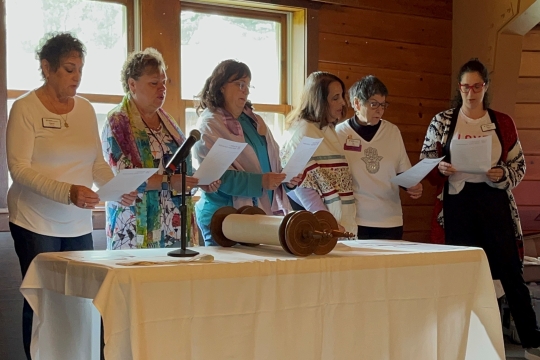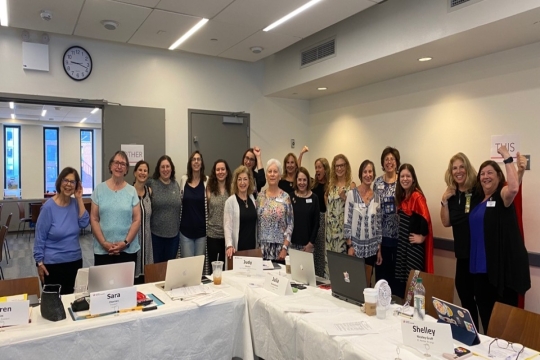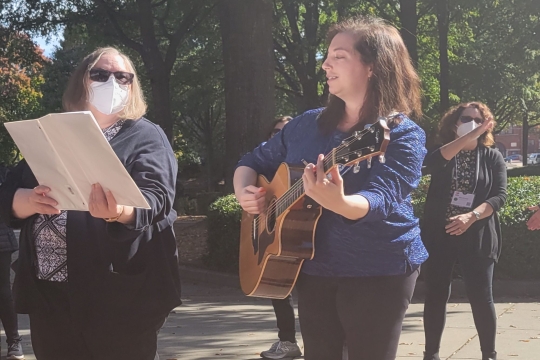
Nitzavim begins with these words:
“You stand this day, all of you, before your God -- you tribal heads, you elders, and you officials, all the men of Israel, you children, you women, even the stranger within your camp, from woodchopper to water drawer -- to enter into the covenant of your God, which your God is concluding with you this day …” (Deuteronomy 29:9-11)
Much has been written about the fact that women are included in this ceremony. Hooray! We were there. We weren’t left tending the fires to make the dinner for the men’s big celebration. We were there.
Look, though, at the order of this list. It’s clearly ranked by order of importance. Tribal heads first, strangers last. And where are the women? We are second to last. Our children stand before us. The strangers are at our rear. The men are in the first four groups of people.
We are not standing shoulder to shoulder with our husbands, our fathers, our brothers, our sons. Even our underage daughters stand ahead of us.
I understand that this ceremony was at a different time and place, a different culture.
In our own lives, however, are there times where we, the women, are left standing apart from the men? Are there times when we don’t assert our own position as being greater than the back of the line?
In my own congregation, I have seen old gender norms surprisingly rear their ugly heads without the clergy or leadership even realizing how they are playing out.
It happened last Rosh Hashanah and Yom Kippur during the Torah service. During each service, three heteronormative couples were called to the bimah for the honor of carrying the Torahs during the hakafa. And each time, our female rabbi handed the Torah to the man in the couple. The women were left following a step behind as the Torah her husband was carrying moved through the sanctuary.
Yes, one of the Torahs is extremely heavy, but two are not. And that heavy Torah, I’ve carried it. Me, a 5-foot 2-inch woman who doesn’t regularly (or ever) lift weights, have carried it.
Then I watched when it came to the moment at each service when the Torah needed to be lifted and then dressed. And so, we again went with the man in the couple lifting the Torah and the woman in the couple dressing it.
What?!!!
Why aren’t the women insisting that they carry the Torah or lift it? Why don’t we see the men lighting the candles more while their partners bless the wine? Why don’t they dress the Torah?
In this age when two women in my congregation fought the state of Texas to be married to one another years before the Supreme Court decision, why aren’t non-heteronormative couples being represented?
Why are we even choosing couples? When we do that, we exclude the widows, the unmarried, and the Jews married to non-Jews.
This High Holiday season and all year long, ask yourselves: Where are the biases that you find in the rituals we celebrate? Are you choosing gender-neutral language? Are you choosing roles and volunteer jobs based on gender?
Where are the biases that you see play out in your home or your work? Does the laundry only get done if you do it? Does the lawn only get done if he does it?
At work, are there times when you are left cleaning up after those messy male coworkers you work with? Do you find yourself not speaking up in a meeting or always offering to play a secretarial role? Have your pathways to promotions been blocked or are you blocking someone else’s pathway?
It goes beyond just fighting for equal pay. It goes to demanding to be seen as an equal human first, especially in our houses of worship.
May your High Holiday season be filled with meaningful prayer and equality for all who worship underneath our tents and beyond.
Nicole Villalpando is the secretary of Women of Reform Judaism, a past president of the Southwest District and her sisterhood at Congregation Beth Israel in Austin. Nicole is a reporter and editor at the Austin American-Statesman newspaper and a wellness coach for WW, formerly known as Weight Watchers. She and her husband Rob are parents to 15-year-old Ava and 18-year-old Ben.
Related Posts

Parashat Yom Rishon shel Rosh HaShanah

Cultivating a Culture of Accountability and Belonging


